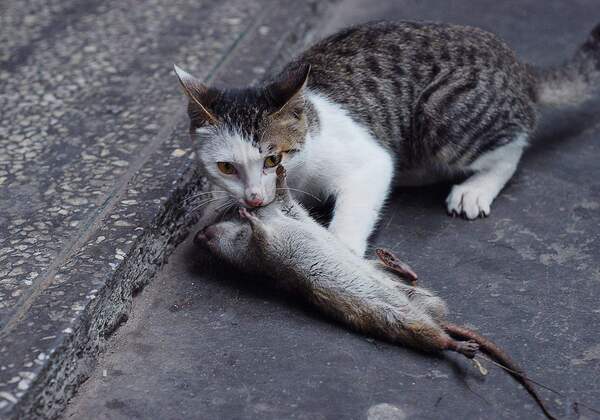If you’ve ever found a dead mouse, bird, or other small creature left as a “gift” on your doorstep or even inside your home, courtesy of your cat, you’re not alone. Many cat owners are both baffled and, frankly, a little grossed out by this behavior. But why do cats bring you dead animals? To understand this seemingly strange habit, we need to look at the evolutionary history of our feline companions and their deep-rooted instincts.

At their core, domesticated cats (whether indoor or outdoor) are descendants of wild cats, who are instinctual hunters. Even though modern domestic cats don’t need to hunt for food, the predatory drive is still strong. Cats are obligate carnivores, meaning their bodies are built to hunt and consume other animals. This instinct is so ingrained that even well-fed cats will hunt and kill for reasons beyond hunger.
When your cat brings you a dead or injured animal, it’s a reflection of their innate predatory skills. They aren’t necessarily trying to gross you out or make a mess, but rather they are fulfilling their natural instincts. For them, the thrill of the hunt is rewarding, even if they don’t need the catch to survive.
Cats often bring their human companions dead animals because they consider you part of their family, or more specifically, part of their “pack.” In the wild, mother cats bring dead or injured prey to their kittens to teach them how to hunt. This behavior might explain why your cat brings you dead animals—they may see you as a family member who needs to learn the important skill of hunting.
Some experts even suggest that cats bring prey to their humans because, in their eyes, we’re not particularly good hunters ourselves. Unlike cats, we don’t regularly chase or catch small animals, so your cat might be trying to “help” by sharing their catch with you, in the same way they would with their young.
While cats may not always seem as affectionate or demonstrative as dogs, many cat owners believe their pets view them as companions and caretakers. Bringing a dead animal could be your cat’s way of thanking you. Since they can’t express gratitude in words, they might choose to show appreciation by presenting you with the fruits of their hunt. It’s their version of a gift.
Though this may not seem like a pleasant offering to you, to your cat, it’s a high honor. After all, they’re giving you something they worked hard to catch.
If you have more than one cat, especially if one is younger or a kitten, the older or more experienced cat may bring dead animals to teach the younger one how to hunt. This is common in wild feline species, where mothers and older cats help train the younger generation.
If your cat sees itself as a mentor to you, bringing you dead prey might be their way of showing you “the ropes” of hunting, even though you’re probably not too keen on the lesson!
Interestingly, many cats don’t actually eat the prey they catch. In the wild, a cat might eat their catch if food is scarce, but domesticated cats are usually well-fed and hunt purely for sport. Hunting for fun is common in cats, as the act of stalking, chasing, and catching the prey is what stimulates them the most. When they bring you the animal, they might not have any intention of eating it themselves; instead, they are showing off their hunting success or offering it to you as a token.
Even indoor cats, who have never been exposed to the outdoors, may show similar behaviors. They might bring you a toy mouse, a feather, or some other small object as a substitute for real prey. This is their way of mimicking their wild counterparts and fulfilling the same natural instincts.
While your cat’s “gift” of a dead animal might be unpleasant, it’s important to understand that they’re not trying to upset you. They’re simply following their instincts. If this behavior becomes a problem or you want to discourage it, here are a few strategies to consider:
Don’t Punish the Cat: Cats don’t understand punishment the way humans do, and reprimanding them could confuse or stress them. Instead, try to gently remove the animal without making a big deal out of it.
Keep Your Cat Indoors: If you don’t want your cat bringing home dead animals, consider keeping them indoors. While this might not completely eliminate their predatory instincts, it will certainly prevent them from catching real prey.
Provide Toys and Play: Engage your cat’s hunting instincts in a positive way by providing plenty of toys that mimic prey (feather wands, laser pointers, etc.). Regular play sessions can satisfy their natural urges to stalk, chase, and “catch” something.
When your cat brings you a dead animal, it’s not a malicious or gross act from their perspective. It’s a reflection of their evolutionary history and hunting instincts, deeply embedded in their behavior. Whether they’re seeing you as family, trying to teach you, or just showing off their skills, your cat’s actions come from a place of instinct and affection. Though it may be an unpleasant surprise, it’s a reminder that our domesticated pets still carry the wild instincts of their ancestors, even within the comfort of our homes.
animal tags: cat
We created this article in conjunction with AI technology, then made sure it was fact-checked and edited by a Animals Top editor.